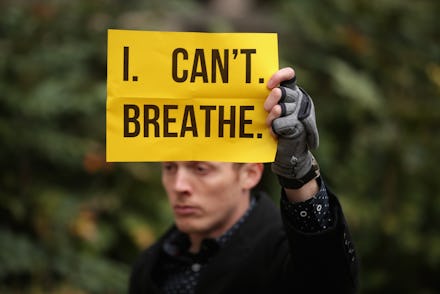DOJ replaces team reviewing Eric Garner police chokehold death — but will it matter?

It's been over two years since the chokehold death of Eric Garner in New York City helped to make the Movement for Black Lives a global phenomenon. But a decision on whether to criminally charge Officer Daniel Pantaleo, the officer responsible for Garner's death, has languished at the local level because the federal prosecutors and the FBI disagree on the matter.
That may be why the Department of Justice recently moved to replace the New York-based team of agents and lawyers, which has been investigating Garner's case, the New York Times reported late Monday. According to a handful of New York and Washington federal law enforcement officials who spoke to the Times, the FBI agents handling the case were swapped out for agents from outside New York.
That could bring new life to the case against Pantaleo, according to the Times. It was reportedly the the New York-based FBI agents who didn't agree that there is clear enough evidence to bring civil rights charges against the officer.
Garner, the 43-year-old unarmed black man, died in July 2014 on a Staten Island street corner where New York police officers confronted him for allegedly selling loose and untaxed cigarettes. He was captured on video pleading with Pantaleo, "I can't breathe." In December of that year, a grand jury in New York City declined to indict the officer, who had been placed on modified duty and stripped of his badge and gun following the incident.
Pantaleo's lawyer, Stuart London, said his client didn't violate Garner's constitutional right against unreasonable seizure or arrest. "This was always a simple street encounter where Officer Pantaleo utilized his NYPD training to subdue an individual," London told the Times.
The chokehold maneuver used on Garner was banned by the New York Police Department in 1993. Pantaleo has reportedly argued that he did not mean to put Garner in a chokehold. He had tried to execute a different maneuver that would both subdue the subject and keep Pantaleo safe.
In order to mount a civil rights case, the investigating agents need evidence that Pantaleo knowingly and willfully violated Garner's civil rights. Under federal statute, that's known as a "color of law" violation.
The delays in resolving one of the most prominent cases in the Movement for Black Lives has been hurtful to Garner's family. In September, Erica Garner expressed doubt that the DOJ would ever deliver justice in her father's name. Garner did not return requests for comment.